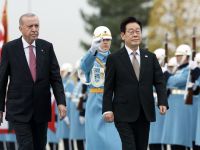An Egyptian military officer has asserted that tests on troops that participated in the Gulf War showed them to be free of any disease related to depleted uranium, reported the official Kuwaiti news agency (KUNA), citing a press report.
The director of the chemical war department at the Egyptian armed forces, Major-General Tharwat Al Zenati, said in a press statement issued in Cairo Thursday that personnel could only become infected with diseases related to depleted uranium if they used arms containing uranium or were attacked by missiles with chemical warheads.
The Egyptian forces did not experience this, he added.
The officer added that all appropriate measures had been taken to secure Egyptian borders, and that the best technology was being used to discover, measure and monitor radiation leaks.
AFP reported in January that air samples taken near the Iraqi border with Kuwait revealed levels of ionizing radiation in the atmosphere 20 times higher than in the Iraqi capital, Baghdad.
The samples were taken two months earlier around a battlefield in the 1991 Gulf War.
NATO's view is that armor-piercing depleted uranium shells reportedly used in the conflict have negligible radioactivity.
The US and Britain have said the uranium particles pose a health risk only if inhaled immediately after the explosion and in significant quantities.
"Current research indicates it would be virtually impossible for a person to inhale enough depleted uranium particles for it to be a health risk," a spokesman at NATO's military headquarters in Mons, Belgium said.
But experts said the British defense ministry had dangerously underestimated the health risks - Albawaba.com
© 2001 Al Bawaba (www.albawaba.com)







